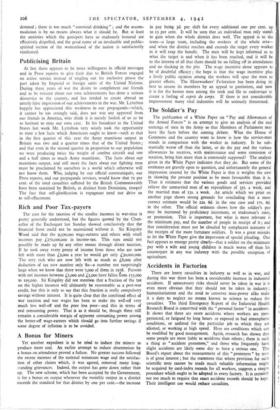Rich and Poor Tax-payers
The case for the taxation of the smaller incomes in war-time is pretty generally understood, but the figures quoted by the Chan- cellor of the Exchequer last Sunday showed conclusively that the financial front could not be maintained without it. Sir Kingsley Wood said that the 9,500,000 wage-earners and others with small incomes pay £270,000,000 in income-tax. This sum could not possibly be made up by any other means through direct taxation. If he took away every penny of income from those who are now left with more than £2,000 a year he would get only £3o,00op00. The very rich who are now left with as much as £6,000 after deduction of tax now number only So—a number not surprisingly large when we know that there were 7,000 of them in 1938. Persons with net incomes between £I,000 and £2,000 have fallen from 155,000
to 1o5,00o. Sir Kingsley did not mention that a fraction of the tax on the higher incomes will ultimately be recoverable as a post-war credit, but this is only to say that this fraction is really compulsory savings without interest. It is quite clear that the combined effect of war taxation and war wages has been to make the well-off very much less well-off and the poor less poor—and this in terms of real consuming power. That is as it should be, though there still remains a considerable margin of apparent consuming power among the better-off wage-earners which should go into further savings if some degree of inflation is to be avoided.


























 Previous page
Previous page